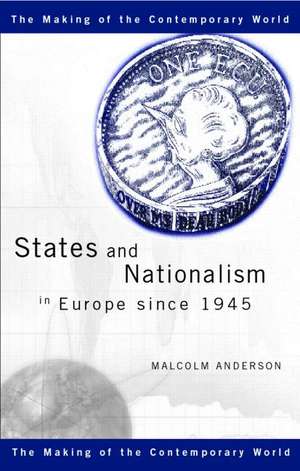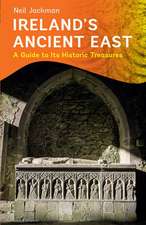States and Nationalism in Europe since 1945: The Making of the Contemporary World
Autor Malcolm Andersonen Limba Engleză Paperback – 10 aug 2000
* the relationship of nationalism to the Cold War
* the re-emergence of demands by stateless nations
* European integration and globalisation
* immigration since the 1970s
* the effects of nationalism on the former Soviet Union and Eastern block.
Din seria The Making of the Contemporary World
-
 Preț: 286.10 lei
Preț: 286.10 lei -
 Preț: 286.99 lei
Preț: 286.99 lei -
 Preț: 283.67 lei
Preț: 283.67 lei -
 Preț: 278.64 lei
Preț: 278.64 lei -
 Preț: 381.21 lei
Preț: 381.21 lei -
 Preț: 228.41 lei
Preț: 228.41 lei - 18%
 Preț: 993.97 lei
Preț: 993.97 lei -
 Preț: 352.51 lei
Preț: 352.51 lei - 18%
 Preț: 996.65 lei
Preț: 996.65 lei -
 Preț: 341.16 lei
Preț: 341.16 lei -
 Preț: 337.50 lei
Preț: 337.50 lei - 17%
 Preț: 236.54 lei
Preț: 236.54 lei -
 Preț: 349.10 lei
Preț: 349.10 lei -
 Preț: 344.90 lei
Preț: 344.90 lei -
 Preț: 344.90 lei
Preț: 344.90 lei -
 Preț: 380.07 lei
Preț: 380.07 lei -
 Preț: 342.13 lei
Preț: 342.13 lei -
 Preț: 292.27 lei
Preț: 292.27 lei -
 Preț: 357.13 lei
Preț: 357.13 lei -
 Preț: 344.90 lei
Preț: 344.90 lei - 18%
 Preț: 996.83 lei
Preț: 996.83 lei -
 Preț: 338.26 lei
Preț: 338.26 lei - 18%
 Preț: 1000.27 lei
Preț: 1000.27 lei -
 Preț: 347.25 lei
Preț: 347.25 lei -
 Preț: 342.47 lei
Preț: 342.47 lei -
 Preț: 338.24 lei
Preț: 338.24 lei - 31%
 Preț: 761.34 lei
Preț: 761.34 lei
Preț: 337.33 lei
Nou
Puncte Express: 506
Preț estimativ în valută:
64.57€ • 70.16$ • 54.27£
64.57€ • 70.16$ • 54.27£
Carte tipărită la comandă
Livrare economică 21 aprilie-05 mai
Preluare comenzi: 021 569.72.76
Specificații
ISBN-13: 9780415195584
ISBN-10: 0415195586
Pagini: 120
Dimensiuni: 138 x 216 x 7 mm
Greutate: 0.16 kg
Ediția:New.
Editura: Taylor & Francis
Colecția Routledge
Seria The Making of the Contemporary World
Locul publicării:Oxford, United Kingdom
ISBN-10: 0415195586
Pagini: 120
Dimensiuni: 138 x 216 x 7 mm
Greutate: 0.16 kg
Ediția:New.
Editura: Taylor & Francis
Colecția Routledge
Seria The Making of the Contemporary World
Locul publicării:Oxford, United Kingdom
Public țintă
UndergraduateCuprins
1. The Cold War and Nationalism 2. Nationalism and Minorities 3. European Integration and Globalisation 4. Nationalism and Immigration 5. Nationalism and the Break-Up of the Soviet Union and Yugoslavia 6. Irredentism and Seperatism 7. Democracy and Nationalism
Recenzii
'Malcom Anderson has written a book of eminent good sense, drawing upon a lifetime of scholarship on the politics of Western Europe. That he wears such scholarship lightly makes this book accessible and readable, but no-one should doubt the force and implications of his argument.' - Scottish Affairs
Descriere
Examines the ceaseless controversies surrounding the ideas of the nation and nationalism, and shows that they are far from dead in twenty-first century Europe.













